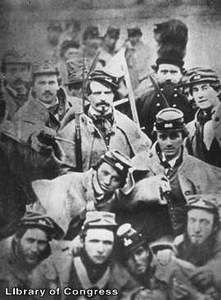 The steady drip of bad news within the Confederacy continues. The summer and fall of 1863 witnessed a growing number of soldier desertions, a problem that only worsens during the cold days of winter.
The steady drip of bad news within the Confederacy continues. The summer and fall of 1863 witnessed a growing number of soldier desertions, a problem that only worsens during the cold days of winter.
Already short of manpower, military officials (unlike earlier in the war) now routinely execute deserters who are unfortunate enough to be caught. The prospect of death, however, does little to stem the flow of escapees, many of whom do succeed in returning home.
Only reluctantly is the problem of desertion mentioned in Confederate periodicals, as government, military, civic and religious leaders do not wish to further darken the nation’s collective mood. When written about, the object is to discourage the practice.
Confounding the problem of desertion is that the families of soldiers are encouraging such action, as is noted in an unusually frank assessment in a letter written by an anonymous Southern Baptist colporter that is addressed to the publisher of the North Carolina Baptist Biblical Recorder and printed in this week’s edition of the paper:
Dear Bro. Hufham — While recently in Gen. Lee‘s army the subjects of desertion and religious life in the army were often discussed in my presence by the soldiers.
They say that the desertions are usually caused by the complaining letters from home (a friend from home murmuring about the hard times and advising the soldier to desert, or representing matters at home so desperate a condition that this tempts him to desert his post), and that in nearly every instance where a soldier is shot the cause may be traced to this abused kindness–this sinful complaining and advice from home.
Again, the spread of religion has been materially advanced by the religious letters from home. For instance, an officer from a Louisiana brigade said that while the revival began there by five or six men holding secret prayer meetings in the woods, yet that he never before thought that religious letters from home could have such an effect upon the soldiers. Many of them told me that the power of these letters could not be measured, it was so great.
One young man told me that before the war began he had left home contrary to his parent’s advice and gone to the far West–that he was quite wicked–that he joined the army–his parents had been faithful in sending him religious letters–that he had lately made a profession of religion–was now happy for the first time–the war had been a great blessing to him–and that if he survived the war he should live with and support his parents while he and they should live.
How much happier do these parents feel, having done their duty and learned that he is a christian, and if God spares him will support them in old age, than those parents of friends who, by false advice, have disgracefully and forever lost their soldier boys and husbands, to themselves, to their country, and it may be as to their souls, and have become their murderers too.
Our soldiers love, with intensest affection, their friends at home, &c.–their religious letters reach their souls–and their complaining letters have such an effect that they lead them to desert their posts often at the peril of their lives.
Would it not be well for ministers to urge their congregations to write many religious, and no other kind of letters to their army friends.
A COLPORTER
Home front family and friends, in short, are guilty of murder if they tell their loved ones the truth of their home front situation and their husband, son, brother or friend tries to desert from the army and is executed. The extent of the desperation sweeping the South is such that even some religious leaders are demanding that the truth be withheld from the very men fighting to preserve what remains of the slave-based Confederacy.
Confederate soldiers, however, are not the only Southerners trying to escape from their unhappy lot. Braving threats of death if caught, slaves are escaping behind Union lines in rapidly increasing numbers. For the one, setting out for home is often a death sentence, while for the other leaving for the North means severe punishment or death if apprehended. In between is the occasional escaped-slave-turned-Union soldier who, if captured by Confederate forces, is often executed for returning to the South with a rifle in hand.
Against this backdrop of cascading death that ever more threatens to snuff out the lives of Southerners–white or black–disloyal to the Confederacy, today a Seventh Day Baptist memorial statement is read in Washington, D.C. before the United States House of Representatives:
The memorial of the Yearly Meeting of the Seventh Day Baptists of the States of Rhode Island and Connecticut, praying the abolition of slavery; which was referred to the Select Committee on Emancipation.
As has been the case for many decades now, some Baptists thus pray for the preservation of African slavery, while others pray for the abolition of slavery. Now, almost three years into the war over slavery, emancipation for blacks is well underway even as Southern whites are increasingly held hostage within the ranks of the Confederate Army.
Sources: Biblical Recorder, January 30, 1864 (link); Journal of the House of Representatives of the United States, 1863-1864, Thursday, January 28, 1864 (link)


